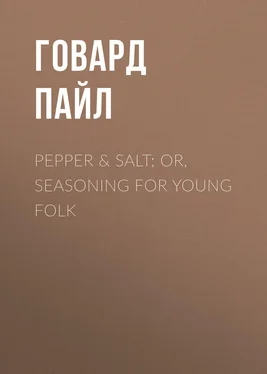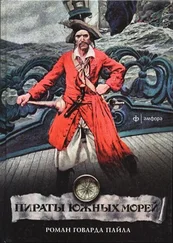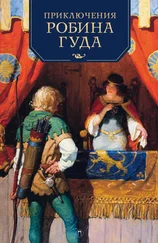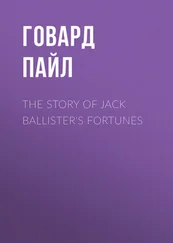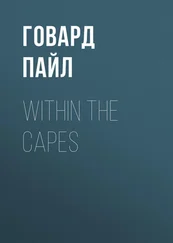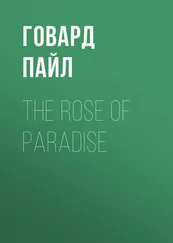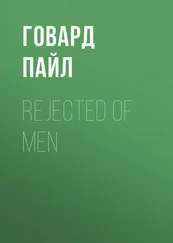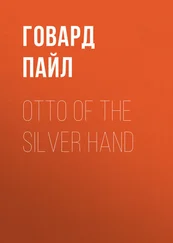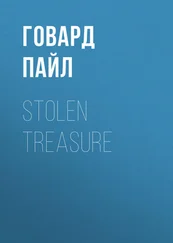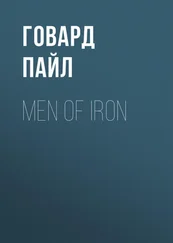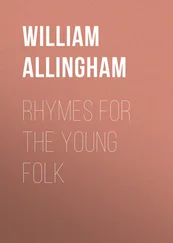Говард Пайл - Pepper & Salt; or, Seasoning for Young Folk
Здесь есть возможность читать онлайн «Говард Пайл - Pepper & Salt; or, Seasoning for Young Folk» — ознакомительный отрывок электронной книги совершенно бесплатно, а после прочтения отрывка купить полную версию. В некоторых случаях можно слушать аудио, скачать через торрент в формате fb2 и присутствует краткое содержание. Жанр: foreign_antique, foreign_prose, foreign_poetry, foreign_children, Сказка, на английском языке. Описание произведения, (предисловие) а так же отзывы посетителей доступны на портале библиотеки ЛибКат.
- Название:Pepper & Salt; or, Seasoning for Young Folk
- Автор:
- Жанр:
- Год:неизвестен
- ISBN:нет данных
- Рейтинг книги:4 / 5. Голосов: 1
-
Избранное:Добавить в избранное
- Отзывы:
-
Ваша оценка:
- 80
- 1
- 2
- 3
- 4
- 5
Pepper & Salt; or, Seasoning for Young Folk: краткое содержание, описание и аннотация
Предлагаем к чтению аннотацию, описание, краткое содержание или предисловие (зависит от того, что написал сам автор книги «Pepper & Salt; or, Seasoning for Young Folk»). Если вы не нашли необходимую информацию о книге — напишите в комментариях, мы постараемся отыскать её.
Pepper & Salt; or, Seasoning for Young Folk — читать онлайн ознакомительный отрывок
Ниже представлен текст книги, разбитый по страницам. Система сохранения места последней прочитанной страницы, позволяет с удобством читать онлайн бесплатно книгу «Pepper & Salt; or, Seasoning for Young Folk», без необходимости каждый раз заново искать на чём Вы остановились. Поставьте закладку, и сможете в любой момент перейти на страницу, на которой закончили чтение.
Интервал:
Закладка:
Oh yes, Claus could do that; that was no such hard thing. So he took the bottle of yellow water and off he went.
By-and-by he came to the place where he had cut his hazel-twig. There he did as the master of black-arts had told him; he poured the yellow water over the stump of hazel from which he had cut his staff. Then everything happened just as the other had said: first there came seven green snakes out of the hole at the foot of the hazel-bush, and after they had all gone, there came a white snake, with a little golden crown on its head, and with its body gleaming like real silver. Then Claus caught the white snake, and put it into the bottle and corked it up tightly. After he had done this he went back to the master of black-arts again.
Now this white snake was what the folk call a tomtsnake in that land. Whoever eats of a broth made of it can understand the language of all the birds of the air and all the beasts of the field; so nobody need wonder that the master was as glad as glad could be to have his white snake safe and sound.
He bade Claus build a fire of dry wood, and as soon as there was a good blaze he set a pot of water upon it to boil. When the water in the pot began to boil, he chopped up the white snake into little pieces and threw them into it. So the snake boiled and boiled and boiled, and Claus stared with wonder as though he would never shut his eyes again.
Now it happened that just about the time that the broth was cooked, the master was called out of the room for this or for that. No sooner was his back turned than Claus began to wonder what the broth was like. "I will just have a little taste," said he to himself; "surely it can do no harm to the rest of the soup." So he stuck his finger first into the broth and then into his mouth; but what the broth tasted like he never could tell, for just then the master came in again, and Claus was so frightened at what he had done that he had no wits to think of the taste of anything.
Presently the master of black-arts went to the pot of broth, and, taking off the lid, began smelling of it. But no sooner had he sniffed a smell of the steam than he began thumping his head with his knuckles, and tearing his hair, and stamping his feet. " Somebody's had a finger in my broth!!! " he roared. For the master knew at once that all the magic had been taken out of it by the touch of Claus's finger.
As for poor Claus, he was so frightened that he fell upon his knees, and began begging: "Oh! dear master – " But he got no further than this, for the master bawled at him,
"You have taken the best,
You may have the rest."
And so saying, he threw pot and broth and all at Claus, so that if he hadn't ducked his head he might have been scalded to death. Then Claus ran out into the street, for he saw that there was no place for him to stay in that house.
Now in the street there was a cock and a hen, scratching and clucking together in the dust, and Claus understood every word that they said to each other, so he stopped and listened to them.
This is what they said:
The cock said to the hen, "Yonder goes our new serving-man."
And the hen said to the cock, "Yes, yonder he goes."
And the cock said to the hen, "He is leaving the best behind him."
And the hen said to the cock, "What is it that he is leaving?"
And the cock said to the hen, "He is leaving behind him the witch-hazel staff that he brought with him."
And the hen said to the cock, "Yes, that is so. He would be a fool to leave that behind, yet he is not the first one to think that peas are pebbles."
As for Claus, you can guess how he opened his eyes, for he saw how the land lay, and that he had other ears than he had before.
"Hui!" said he, "that is good! I have bought more for my penny than I had in my bargain."
As for the hazel staff, he was not going to leave that behind, you may be sure. So he sneaked about the place till he laid hand on it again; then he stepped away, right foot foremost, for he did not know what the master of black-arts might do to him if he should catch him.
Well, after he had left the town, he went along, tramp! tramp! tramp! until, by-and-by, he grew tired and sat down beneath an oak-tree to rest himself.
Now, as he sat there, looking up through the leaves, thinking of nothing at all, two ravens came flying and lit in the tree above him. After a while the ravens began talking together, and this was what they said:
The one raven said, "Yonder is poor Claus sitting below us."
And the other raven said, " Poor Claus, did you say, brother? Do you not see the witch-hazel lying on the ground beside him?"
The one raven said, "Oh yes; I see that, but what good does it do him?"
And the other raven said, "It does him no good now, but if he were to go home again and strike on the great stone on the top of the hill back of Herr Axel's house, then it would do him good; for in it lies a great treasure of silver and gold."
Claus had picked up his ears at all this talk, you may be sure. "See," said he, "that is the way that a man will pass by a great fortune in the little world at home to seek for a little fortune in the great world abroad" – which was all very true. After that he lost no time in getting back home again.
"What! are you back again?" said Hans.
"Oh yes," said Claus, "I am back again."
"That is always the way with a pewter penny," said Hans – for that is how some of us are welcomed home after we have been away.
As for Claus, he was as full of thoughts as an egg is of meat, but he said nothing of them to Hans. Off he went to the high hill back of Herr Axel's house, and there, sure enough, was the great stone at the very top of the hill.
Claus struck on the stone with his oaken staff, and it opened like the door of a beer vault, for all was blackness within. A flight of steps led down below, and down the steps Claus went. But when he had come to the bottom of the steps, he stared till his eyes were like great round saucers; for there stood sacks of gold and silver, piled up like bags of grain in the malt-house.
At one end of the room was a great stone seat, and on the seat sat a little manikin smoking a pipe. As for the beard of the little man, it was as long as he was short, for it hung down so far that part of it touched the stone floor.
"How do you find yourself, Claus?" said the little manikin, calling Claus by his name.
"So good!" said Claus, taking off his hat to the other.
"And what would you like to have, Claus?" said the little man.
"I would like," said Claus, "to have some money, if you please."
"Take what you want," said the little man, "only do not forget to take the best with you."
Oh no; Claus would not forget the best; so he held the staff tighter than ever in his fist – for what could be better than the staff that brought him there? So he went here and there, filling his pockets with the gold and silver money till they bulged out like the pockets of a thief in the orchard; but all the time he kept tight hold of his staff, I can tell you.
When he had as much as his pockets could hold, he thanked the little manikin and went his way, and the stone door closed behind him.
And now Claus lived like a calf in the green corn-field. Everything he had was of the best, and he had twice as much of that as any of the neighbors. Then how brother Hans stared and scratched his head and wondered, when he saw how Claus sat in the sun all day, doing nothing but smoking his pipe and eating of the best, as though he were a born prince! Every day Claus went to the little man in the hill with his pockets empty, and came back with them stuffed with gold and silver money. At last he had so much that he could not count it, and so he had to send over to brother Hans for his quart-pot, so that he might measure it.
Читать дальшеИнтервал:
Закладка:
Похожие книги на «Pepper & Salt; or, Seasoning for Young Folk»
Представляем Вашему вниманию похожие книги на «Pepper & Salt; or, Seasoning for Young Folk» списком для выбора. Мы отобрали схожую по названию и смыслу литературу в надежде предоставить читателям больше вариантов отыскать новые, интересные, ещё непрочитанные произведения.
Обсуждение, отзывы о книге «Pepper & Salt; or, Seasoning for Young Folk» и просто собственные мнения читателей. Оставьте ваши комментарии, напишите, что Вы думаете о произведении, его смысле или главных героях. Укажите что конкретно понравилось, а что нет, и почему Вы так считаете.
